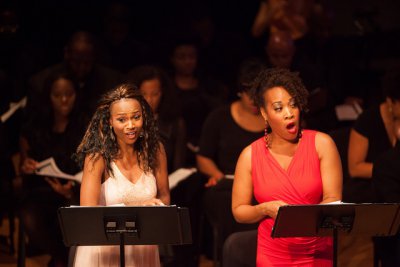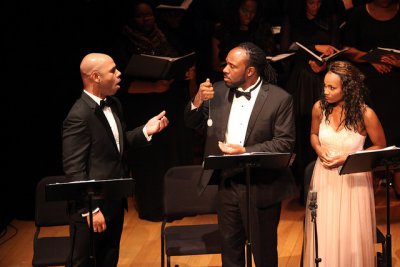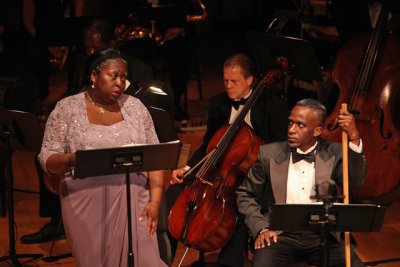Voodoo, A Harlem Renaissance Opera

JoAnna Marie Ford and Janinah Burnett in a scene from “Voodoo, a Harlem Renaissance Opera” (Photo credit: Regina Fleming)
[avatar user=”Jean Ballard Terepka” size=”96″ align=”left” ] Jean Ballard Terepka, Music Critic[/avatar] Neglected, ignored and then forgotten, Harry Lawrence Freeman’s opera Voodoo was brought back to the stage in a compelling production in June 2015. The opera was last seen at what turned out to be its only production in 1928. Now, more than three-quarters of a century later, it has been brought back to life by Morningside Opera, Harlem Opera Theater, The Harlem Chamber Players and scores of named and unnamed supporters and fund-raisers in the Harlem music community.
Work on this Voodoo began two years ago. The two night “run” of this semi-staged production was exciting and rewarding. The musicians and singers were passionate in their commitment to the opera; the audience was almost unanimous in the enthusiasm of its response.
Harry Lawrence Freeman (1869-1954) was at one time, especially in the interwar years, one of the most prominent African American musicians in both New York and the United States. He wrote 21 operas, most unpublished, and numerous other works in multiple genres; he was an important teacher and critic. Though he composed Voodoo between 1906 and 1914, its premiere – and final performance – took place in 1928.
Freeman was referred to in his day as the “Negro Wagner.” It’s not a particularly accurate description. While Voodoo does contain mythic material – if a violent confrontation between African Voodoo religious traditions and African American Christianity – somewhat similar to Wagner’s fascination with his own national mythologies, the music itself is not like Wagner’s at all. Instead, it contains recognizable influences of Puccini, Gounod, even Verdi and Delibes, intermixed with contemporary ragtime and early jazz as well as traditional spirituals.
The grand opera plot centers on a doomed and tragic love triangle: on a Southern plantation immediately after the Civil War, a Voodoo priestess Lolo (Janinah Burnett) lusts for the handsome, noble beloved of a sweet Christian girl. The characters are all plantation workers whose world is defined by an illusory hope of new opportunities for self-definition and by cultural struggles between belief systems. In addition to her very human emotions of lust and jealousy, the priestess Lolo contains within herself all the powers of Voodoo spirits, especially the Snake God, is bored by the foolish young man Zeke, who believes he loves her, and revels in her own seething and imperious, earthy and demanding sensuality. Cleota, the Christian girl filled with the eager energy of happy innocence, adores her fine young sweetheart Mando and is guided and protected by her nobly and fervently devout parents.

Barry L. Robinison, Steve Wallace and JoAnna Marie Ford in a scene from “Voodoo, a Harlem Renaissance Opera” (Photo credit: Regina Fleming)
The story moves inexorably towards tragedy. In the end, in a terrible confrontation at a wild Voodoo ritual in the night time bayou heat, Lolo summons Voodoo spirits to kill Cleota; Cleota is briefly summoned back to life by her mother’s cross and holy water; Lolo now succeeds in finally causing Cleota to die and is shot by Mando, enraged and grieving.
It is African American grand opera. It is a universal tragic love triangle. It is a struggle between two sets of spiritual visions of the world. Chaos and disorder hold sway in individual and community lives.
JoAnna Marie Ford (Cleota) created a charming character: her Cleota was not simply a loving innocent but an energetic, determined girl, happy with her sweetheart and maddening to her worried, protective parents. Ford’s lyrical, flexible voice proved capable of unexpected strength as well as gentle tenderness.
Cleota’s loving parents (Darian Worrell as father Ephraham and Crystal Charles as mother Chloe) were convincing in their dignity as elders of their church. Charles sang with rich conviction. Charles’ extended hummed wordless “aria” at the beginning of Act II was a fascinating marvel of accumulated wisdom, a certainty that life brings joy and anguish in equal measure.
Steve Wallace’s manly and charming Mando was entirely plausible as the object of both Cleota and Lolo’s desire. As a singer, he managed the range and demands of his part well.
Barry L. Robinson’s Voodoo priest was appropriately threatening. James R. Hopkins III as Zeke played his role to its full limit, the occasional cracks in his voice serving the dramatic narrative fortuitously well.

Crystal Charles and Darian Worrell in a scene from “Voodoo, a Harlem Renaissance Opera” (Photo credit: Regina Fleming)
Of all the soloists, Burnett was exceptional. Her performance as Lolo was stunning. She possessed us. She inhabited her role completely: Burnett sang powerfully and intensely, a twenty-first century artist of powerful artistry as much as she was a priestess summoned into being by uncontainable, ancient sacred spirits.
Chorus and orchestra were both marvelous. The twelve-person chorus, serving alternately as Voodoo adherents and Christians, created context and mood. The orchestra played with elegant coherence.
Music director and conductor Gregory Hopkins was masterful as he led soloists, chorus and orchestra in the passionate performance of Freeman’s difficult and complex music.
Melissa Crespo’s stage direction was lean and effective. Caite Hevner Kemp’s paintings, projected on a screen at the back of the stage, were evocative and imaginative.
Unfortunately, the uneven Miller Theatre acoustics made the singers’ words sometimes hard to understand: some audience members complained that the singers’ words were garbled and overwhelmed by the orchestra, while other, especially those seated in the balcony, indicated the singers were easy to understand and clear.
Ultimately, Freeman’s opera is uneven in quality. But there is more that is worthy and important than dull or derivative. There are extended passages – in the overture, in some choral passages, in orchestral movements (presumably material for dance sequences in a fully mounted production) in which banjo and harp are used inventively, and in Lolo’s grand arias – in which Freeman’s music is distinctively his own … and no one else’s.
The thrill of this production lay in some of the singers’ performances, in the reestablishment of Freeman’s presence in American musical history and in the passion of the commitment of Morningside Opera, Harlem Opera Theater and The Harlem Chamber Players to this remarkable restoration project.
Voodoo, A Harlem Renaissance Opera (June 26 – 27, 2015)
Morningside Opera, Harlem Opera Theater and The Harlem Chamber Players
Miller Theater, 2960 Broadway at 116th Street, in Manhattan
For information, visit http://www.millertheatre.com, http://www.morningsideoperacom, http://www.harlemoperatheater.org or http://www.harlemchamberplayers.org
Running time: two and a half hours, with one intermission between Act II and Act III






Leave a comment